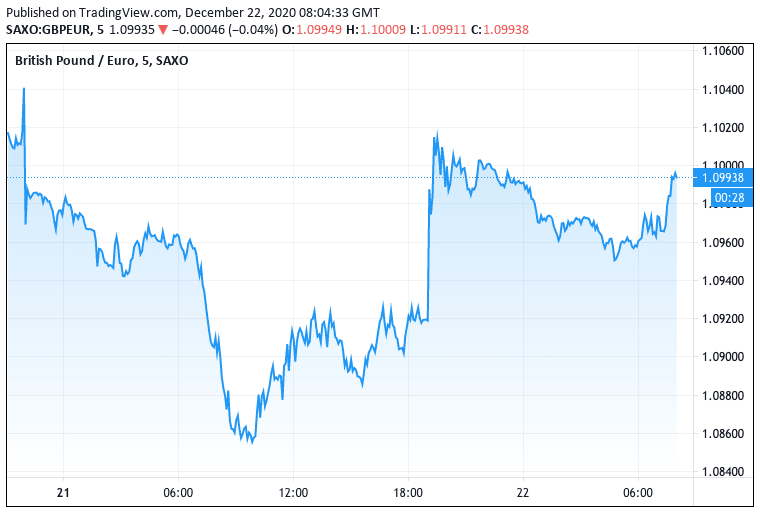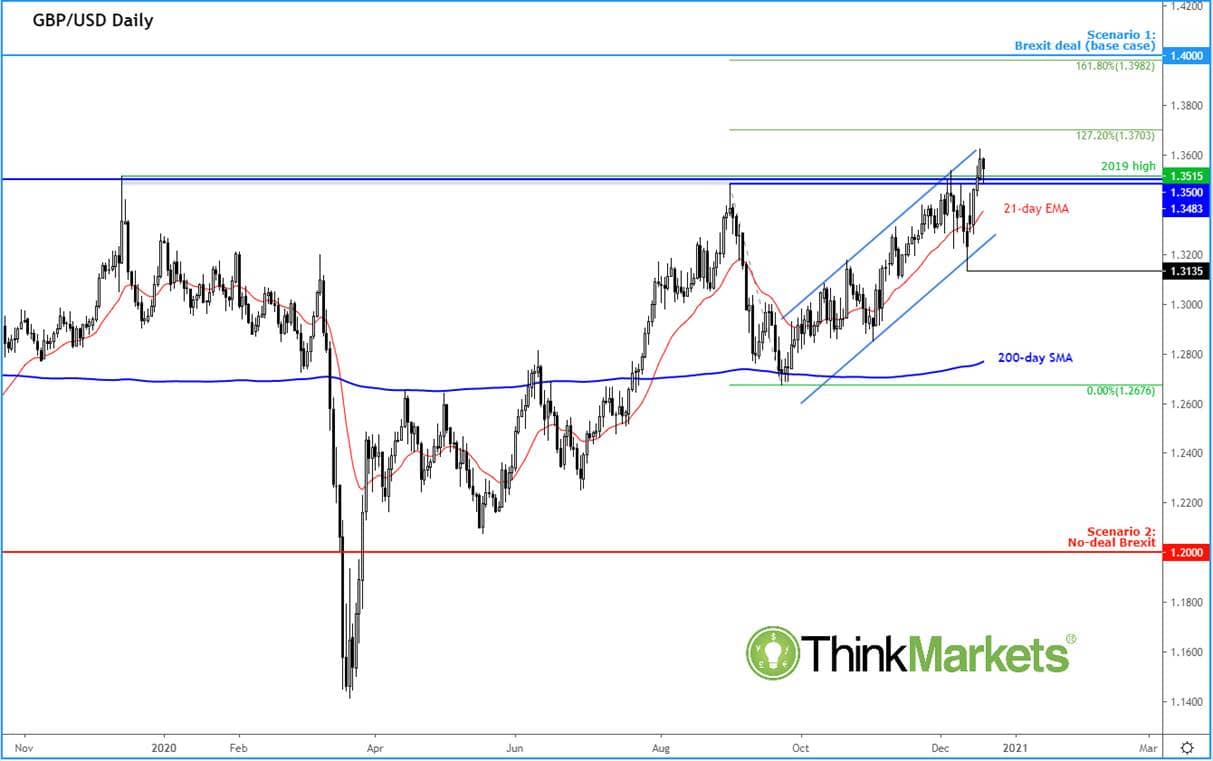Pound Sterling Rebounds against Euro, Dollar on Reports Brexit Negotiators Close in on Fisheries Compromise
- GBP recovers over recent hours
- EU and UK closing in on compromise on fish
- UK faces double-dip recession says Capital Economics
- Forecast levels for GBP on 'deal' or 'no deal'

Picture by Andrew Parsons / No 10 Downing Street
- Market rates: GBP/EUR: 1.1005 | GBP/USD: 1.3442
- Bank transfer rates: 1.0797 | 1.3166
- Specialist transfer rates: 1.0928 | 1.3348
- More about bank-beating exchange rates, here
The British Pound has staged a recovery against the Euro and Dollar over recent hours, returning to levels on Tuesday that suggest the market still expects a deal between the EU and UK.
Negotiators remained locked in talks in Brussels, with unofficial media briefings saying the two sides are slowly giving ground on the matter of fisheries.
EU access to UK fishing waters remains the final sticking point and it appears they are now haggling over quota sizes and the length of any transition period that would keep the EU's access unchanged.
"We note that press and negotiator focus now seems to be on fish, suggesting that the level playing field issues are largely solved," says Rui Ding at Citibank.
The Pound had fallen sharply at the start of the new week, amidst ongoing signs of deadlock in talks and growing market anxieties over a new variant of the SARS-CoV-2 virus.
Above: GBP/EUR decline and recovery over the past 48 hours.
Sentiment has firmed on Tuesday after a number of UK newspapers reported progress in negotiations. The Times is reporting on Tuesday the UK is willing to offer monetary compensation to EU fisherman in order to tempt more concessions from the EU. The Telegraph reports the two sides moved closer to a compromise on fisheries on Monday night and MPs were told to prepare to vote on a potential trade deal on Wednesday next week.
According to the newspaper, the UK tabled an 11th-hour proposal that would see the bloc slash the value of its fishing catch in UK waters by roughly a third over a transition period of five years, it was claimed, down from an initial demand to cut it by 60% over three years.
"The UK has reportedly made a considerable concession on fisheries, dropping its demand for an EU reduction of catches in UK waters from 60% to 35%, still apart from the bloc's demand of 25%. The differences are minuscule in economic terms but politically sensitive," says Steven Colangelo, an analyst with Western Union.
The EU had initially wanted to only give away 18% of its current quota, with a ten-year transition period. The UK had initially wanted to take 80% of the overall quota and offer a three-year transition period.
In the middle is a potential deal.
"The pathway to a deal is still a political 'horeography and the timing is important; it might take a little more brinksmanship to make compromise palatable, perhaps similar to how progress has reportedly been made on the “level playing field” issue," says Zach Pandl, an economist with Goldman Sachs.
The Pound-to-Euro exchange rate fell to a low of 1.0848 on Monday before recovering back to 1.0986 on Tuesday. The Pound-to-Dollar exchange rate fell to a low at 1.3188 before recovering back to 1.3420 on Tuesday.
Goldman Sachs maintain a base-case expectation for a 'thin' Free Trade Agreement to be reached by year-end and continue to think investors should stay 'long' Sterling.
Goldman Sachs forecast the Pound-to-Euro exchange rate at 1.15 if a deal is reached.
In the event of a 'no deal' the investment bank would expect the market to only partially price in a GBP/EUR target of 1.0416 if a deal still seems within reach in early 2021.
"A Brexit deal is still in the making," says Citibank's Ding. Citi say strategists maintain a 80% probability of a deal by year end.
{wbamp-hide start}{wbamp-hide end}{wbamp-show start}{wbamp-show end}
Chances of a Double Dip Recession Rise
Sterling fell sharply at the start of the new week on a combination of Brexit anxiety and news that countries across the world were closing their borders to UK citizens in order to prevent the spread of a new strain of SARS-CoV-2, the virus that causes Covid-19.
The new stain is now the dominant form of the coronavirus in England and Wales and some scientists believe it could be more contagious than earlier variants of the disease.
France closed its borders to all UK traffic on Sunday night, causing a significant tailback at the Port of Dover, the UK's most important border for commerce.
France has put in place new requirements for checks on UK drivers, meaning trade has restarted on Tuesday.
But the disruptions combined with the imposition of Tier 4 restrictions on the majority of England will pose a significant negative impact on UK economic growth in the final month of 2020, according to economists.
Researchers at Capital Economics have told clients that the odds of the UK experiencing a double-dip recession have risen markedly in the wake of the Government placing swathes of England into a tier 4 lockdown.
The Government on Saturday tightened restrictions in the face of a rapid spread in covid-19, with a new variant of the SARS-CoV-2 virus being blamed. Restrictions include the closing of non-essential retail, hospitality venues and other services involving close personal contact.
"The new Tier 4 COVID-19 restrictions, which closely resemble November’s lockdown, raise the chances that the economy stagnates, if not contracts, in the first three months of 2021. If the economy is heading for a double-dip, at least the second leg down will be much smaller than the first. But this is only because activity in some sectors never fully recovered and therefore cannot fall as far this time," says Ruth Gregory, Senior UK Economist at Capital Economics.
Tier 4 restrictions are expected to keep GDP some 14% below its pre-crisis level.
The most heavily impacted sectors account for about 10% of UK GDP, with those under stricter lockdown in the South East accounting for about a third of this number.
Capital Economics say December could see GDP rise just 1.0%, but there is a large risk that restrictions extend into 2021 and result in another quarter of negative growth, resulting in a technical recession.
Secure a retail exchange rate that is between 3-5% stronger than offered by leading banks, learn more.
GBP Levels on 'Deal' or 'No Deal'
The majority of foreign exchange analysts we follow say the potential downside is substantially greater than the potential upside, primarily owing to a consensus belief that a deal will ultimately be secured.
"A deal outcome has been a wide-held and hence embedded expectation in markets for most of this year," says a note from investment bank BNP Paribas.
"If a deal is reached, hopefully this weekend, the pound could surge past the 1.35 handle, before potentially heading towards 1.40s," says Fawad Razaqzada, Market Analyst at ThinkMarkets.
"As the markets have – since March – been led to believe that a deal was going to be reached eventually, the greater risk is if the UK departs without a deal. This outcome will probably come as a shock and could see sterling get a good pounding, sending the cable possibly down to $1.20," says Razaqzada.
BNP Paribas think the Pound-to-Dollar exchange rate (GBP-USD) can initially rise to 1.39 if a deal is secured. The Pound-to-Euro exchange rate (GBP-EUR) could rise to 1.1236.
BNP Paribas say Pound Sterling strength is likely to be further boosted by the deployment of a Covid-19 vaccine and as global reflation hopes continue to build, especially as the currency
remains undervalued versus the USD.
According to BNP Paribas modelling, 'fair value' for the exchange rate would be at 1.37 by the end of 2021.
Neutral market positioning would meanwhile allow investors to build up bets for further advances in Sterling, leaving the investment bank forecasting GBP-USD at 1.44 by the end of 2021 and GBP-EUR at 1.15.
What would happen to the Pound in the event of a 'no deal'?
"Despite the rising negative news flow in recent weeks, the GBP’s move lower has been relatively muted. We see scope for the GBP to weaken sharply in the event of a no-deal outcome," says BNP Paribas.
BNP Paribas' medium-term model suggests GBP-USD fair value under a 'no deal' of around 1.25 and GBP-EUR at 1.0204.
Ranko Berich, Head of Market Analysis at Monex Europe, has done some financial modelling to try and ascertain where Sterling might end up once Brexit talks are concluded.
He finds that a 10% increase in 'no deal' odds on betting markets takes 2 cents off GBP-USD.
Assuming 'no deal' is priced at 20%, a deal takes GBP-USD to ~1.39.
"FX also tends to overshoot the fundamental significance of things so would not be surprised if we saw a "relief rally" much higher," says Berich.
Berich says he believes the odds of a 'no deal' is roughly 15% priced at the moment, and we will see a 1-4% rally on sterling on a deal.
Under a 'no deal' scenario GBP-USD can be expected to fall to ~1.20, or slightly below, which gives a ~10-12% fall.






